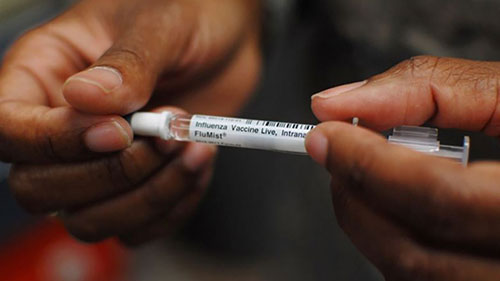“Influenza Outbreak – Worst in 15 years!”
“Children under Five and Senior Citizens are at Risk.”
 Almost daily, news reports have blared scary headlines. They have us thinking, oh no you didn’t when a co-worker sneezes without covering her mouth and holding our breath as we dart from the room.
Almost daily, news reports have blared scary headlines. They have us thinking, oh no you didn’t when a co-worker sneezes without covering her mouth and holding our breath as we dart from the room.
Although I no longer have toddlers in my house, I am nonetheless hyper-vigilant about bringing germs home. My mom who recently turned 90 years old does live with me, and the last thing I want to do is to infect her with this year’s bug. Following the Center for Disease Control recommendation, everyone in my family has received a flu shot, but like many older adults who look askance at the warnings, my mom didn’t bother with the vaccine.
After returning home from work recently, my older son stopped me at the door. “Dad,” he said, “Grandmother’s sick.” My concern rising, I dropped my backpack and headed to my mom’s room. She was sitting up, watching television with red, watery eyes.
“Hi, Mom. How are you feeling?” I asked in a neutral tone. While there are some older adults who have lost responsibility for their lives because they aren’t able to make health decisions or abdicated their authority because they believe that their adult children know what’s best, my mom isn’t one of them. She guards her independence with defensive, short statements followed by an impervious silence that dares anyone to challenge her wishes.
“I’m fine,” she said in a hoarse whisper, but still with enough edge to let me know to leave her alone. I pressed on.
“You don’t sound well,” I said. I stood there while seconds turned into days. As I listened to the crickets in my mind, I wondered, what now? Deciding to cross a line, I did something that I have never done with my mother. I placed the back of my hand against her forehead to check for a fever, just like she did with me when I was a child. She was hot. I asked whether she felt feverish, but of course, she said, “No.”
Needing proof, I got a digital thermometer and asked her to place it in her mouth. Surprisingly, she did without question. In the moments that I waited for it to beep, I considered my next steps. If it were high, I would take her to the emergency room. But if it weren’t, what would I do? She looked terrible. I was concerned about her contracting pneumonia, one of the complications that often kill young children and senior citizens alike.
The thermometer beeped. My mom didn’t have her glasses on. She couldn’t read the numbers, but I could – 102.7 degrees.
“I’m going to take you to the emergency room. Go ahead and get ready,” I said. I left my mother alone before she could give me a debate. However, when I returned, she showed me the thermometer reading again. Now it read, 93.3!
“Uh…that’s not a good number either,” I said. With a sigh, she conceded, and we were off to the hospital. I’d passed the first test – having the courage to discuss health issues with my mother.
For many adult children, it can be tough to step into the role of a care partner. Many of us don’t think or talk about what it means to provide support to an older loved one until a calamity forces us. Having uncomfortable discussions about advanced directives, finances, or physical and emotional needs means preparing for a day when your parent or loved one is no longer the person you remember. It’s acknowledging that loss may be closer than we would like.
For the care recipient, the big fear is relinquishing one’s independence. With each diagnosis or significant health incidence, an older adult’s world can shrink as the activity he has control over dwindles a little more. However, the alternative of waiting until a catastrophic health event comes with financial, emotional and physical risks that are far worse than the discomfort of having conversations before something awful happens.
When we arrived at the emergency room, the healthcare team at the hospital saw Mom immediately. Their focus, as it should have been, was on her and only referenced me when they asked her whether she wanted me in the room while they treated her. They took her vitals, asked questions, and Mom was ready with answers. She had her social security and insurance cards along with descriptions of her medications in a transparent, plastic covering. She readily answered the staff’s questions.
After running a test on a sample, they determined that she indeed had the flu. They gave her meds for the fever and any possible infections. A couple of hours later, we were on our way back home. And within a few days, her health was back to normal.
This incident was my first experience as a care partner for my mother. Fortunate for me, I fell into the shallow end of the pool.
